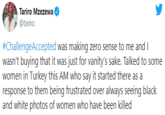"Challenge Accepted" Black and White Selfies
About
"Challenge Accepted" Black and White Selfies refers to a series of participatory selfies that revolve around women posting pictures of themselves in black and white with the hashtag “#challengeaccepted” as part of a social media campaign about “women supporting women.” The theme was primarily seen on Instagram throughout late July 2020.
Origin
The first example to use the theme surfaced online around mid-July 2020, but the exact first is unknown. One of the earliest versions (shown below) was posted on July 15th, by Instagram[1] user saanika, who made use of the hashtags “#challengeaccepted” and “#womensupportingwomen” that are commonly associated with the social media challenge. The photo received over 300 likes.

This 2020 iteration also shares many similarities to the earlier 2016 trend, which included posting black-and-white photos with the same "#challengeaccepted," intended to spread a message of cancer awareness. According to a Metro[12] article originally published in August 2016, "The Challenge Accepted trend, as it’s know, actually began back in 2016 and is believed to have originally started to raise awareness for cancer."
Turkish Variation
In Turkey, the "challenge accepted" hashtag was used as a response to raise awareness about femicide. The original accompanying hashtags were #kadınaşiddetehayır and #istanbulsözleşmesiyaşatır. On July 28th, Twitter[10] user and New York Times reporter Tariro Mzezewa tweeted that she "talked to some women in Turkey this AM who say it started there as a response to them being frustrated over always seeing black and white photos of women who have been killed," receiving nearly 1,000 likes and 650 retweets and comments in less than eight hours (seen below).

Spread
The theme continued to spread to other Instagram users and social media platforms in the following weeks, peaking in late July 2020. On July 26th, Facebook[2] user Tabitha Brown posted her take on the challenge (seen below, left), receiving over 126,000 likes, 11,000 comments and 1,200 shares in 48 hours. On July 27th, Charlize Theron shared her participation in the challenge to her Facebook[3] page (seen below, right), receiving over 123,000 likes, 2,400 comments and 1,400 shares in 24 hours.


On July 27th, Joey King shared her photo to her Instagram[4] account, using both of the associated hashtags, and received over 1.3 million likes in 24 hours (shown below, left). That same day, Jennifer Aniston also shared her photo as part of the challenge on Instagram[5] (shown below, right), receiving over 3.2 million likes in 24 hours.


On July 27th, Redditor[11] need_a_haircut_asap posted a discussion thread to the /r/OutOfTheLoop subreddit and asked, "What is going on with the Instagram 'Challenge Accepted' caption?" and received over 100 upvotes in 24 hours. The top reply in the thread stated, "Answer: a women supporting women trend where women tag other women in their post."
Critics, New York Times Article and Backlash
While many engaged in the social media trend, others critiqued the movement for being an empty platitude. On July 27th, one such Twitter[6] user, alanalevinson, tweeted “Ladies, instead of posting that hot black-and-white selfie, why don’t we ease into feminism with something low stakes, like cutting off your friend who’s an abuser?” and received 971 likes in less than 24 hours. Later that day, Emmy Rossum also tweeted[7] about the challenge and said, “I am a huge believer in women supporting women -- obviously! -- but I don’t understand this “challenge” at all. How is it empowering to other women to post a selfie? Would it not make more sense to post snaps of other woman who empower us?” and received over 2,800 likes and 290 retweets and comments in less than 24 hours (seen below).

On July 27th, New York Times[8] reporter Taylor Lorenz published an article, titled “‘Challenge Accepted’: Why Women Are Posting Black-and-White Selfies,” that criticized the social media trend and made comparisons to Blackout Tuesday. After sharing the article on Twitter,[9] Lorenz posted a series of screenshots showing the reactions from various online users defending the challenge (shown below), receiving over 1,500 likes in less than 12 hours.
The amount of vitriol I’m getting from the black and white selfie crowd is out of this world. It’s not that deep! The dumb black and white challenge accepted thing is IG chain mail that’s been around since 2016. https://t.co/MfUVFh1bjd pic.twitter.com/ewmqQAmkKQ
— Taylor Lorenz (@TaylorLorenz) July 28, 2020
Various Examples



Search Interest
External References
[2] Facebook – Tabitha Brown
[3] Facebook – Charlize Theron
[5] Instagram – Jennifer Aniston
[6] Twitter – alanalevinson
[7] Twitter – emmyrossum
[8] NYTimes – Challenge Accepted Instagram
[9] Twitter – TaylorLorenz
[11] Reddit – r/OutOfTheLoop
[12] Metro – Black and White Photo Challenge
Recent Videos
There are no videos currently available.
















Top Comments
Kommando_Kaijin
Jul 28, 2020 at 02:30PM EDT
iotacom
Jul 29, 2020 at 02:01PM EDT in reply to